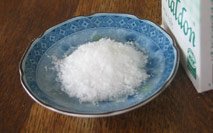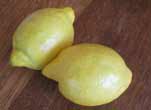Cleaning with Salt - Safe, Cheap and Effective
Cleaning with salt is one of the most natural and easy ways to make your home a green home as well as a clean home!
Salt is a great natural cleaner and has a multitude of uses.
It's very cheap, easily available and it does no harm to the environment in moderate amounts.
The salt we are talking about here is simple table salt, or sodium chloride (NaCl) to give it it's chemical name.
Any table salt sold in supermarkets or other food shops will do perfectly well, whether iodised or not. In fact, you can use the very cheapest stuff you can find. (We are talking household salt, here of course! - not the stuff they put on the roads!)
Here's how to use salt in your cleaning programme.
General household cleaning with salt
Salt dissolves in water and can be mixed with several other natural cleaners.
Vinegar, lemon juice, and washing up liquid all combine safely with salt for various cleaning tasks.
Borax can be used with salt for cleaning carpets and other jobs.
Cleaning with salt, alone or in combination with other natural cleaners can tackle a wide range of household cleaning tasks.
Here are ways to clean with salt for specific jobs about the house.
Washing up

Picture, right: no need to use gourmet salt!
Use it if you run out of washing up liquid.
Just sprinkle salt into the water and wash as usual. Rinse the dishes well. Salt is rather drying on your skin, so you may want to wear gloves or use a skin cream after using it.
You can also use salt as an emergency homemade detergent together with soap. See here for details of how to make this homemade detergent
The "grey water" from washing up using salt is not very suitable for using on your vegetables. It may be too salty for some plants.
General cleaning
Salt can be mixed with vinegar to create a good general purpose cleaner. Don't use it on waxed surfaces, marble or linoleum because the vinegar may be too strong for the surface and cause damage. This vinegar and salt mix can be used for general cleaning about the house. Swab down surfaces and clean inside the fridge and cupboards with it.
It will also remove tea and coffee stains from cups and teapots, etc.
Glass and tiles will come up shining from washing with a salt and vinegar solution.
Oven and hob spills
Cover oven and hob spills with salt.
Let the mixture stand, then wipe up, adding water if necessary. The salt absorbs the liquids and helps lift them from the surface.
It is particularly good at absorbing grease and oils. If you have a gas cooker be careful to remove all the salt when you wipe up the spill. Salt residues may cause your gas burners to flare up with a yellowish flame when you next light the gas.
Cleaning pans
If you have cast iron pans, salt can be a great cleaner.
Just sprinkle salt around and wipe clean. If your pan is not burnt you can do this instead of washing it in water. It will help protect the surface and it will make it more like a non-stick pan!
You can also use salt with hot water. Rinse the pans afterwards and coat with a thin layer of oil. A pastry brush is ideal for this.
You can also wash other types of pan using salt. Enamel pans and ceramic pans respond well, as does stainless steel. I would not use it on non-stick surfaces as you are likely to damage the finish.
Burnt pans
Salt also helps with burnt pans. Add 3 or 4 tablespoonfuls of salt as soon as the damage occurs. I find this invaluable. (Not that I burn a lot of pans, you understand!) It saves a lot of time in undoing the damage, especially if you add salt straight away. Let it soak with a little hot water and then scour away the burnt-on food.
Cleaning metal
Salt can also be mixed with citrus fruit juice to make a handy cleaner for metals. Use lemon juice or lime juice and salt to clean metals such as brass and pewter. Just sprinkle salt into the empty squeezed-out lemon half and use it to rub down the metal. Rinse and buff to a shine with a soft cloth.
Make sure you rinse thoroughly, otherwise your copper and brass will turn green! This is just "verdigris" or copper salts and can be washed off.
Using salt for cleaning laundry and dry materials

Picture: added lemon juice works well for cleaning with salt on some surfaces
Cleaning with salt:
Here are a few ways that salt can be used for laundry and other household tasks such as dust cleaning.
Delicate items
Salt can also be sprinkled on some (dry) materials to clean off dust and dirt. For example if you have delicate cloth items or artificial flowers which have dust embedded in the folds, a sprinkling of salt will gather the dust and it can be carefully shaken out of the item.
Other ways of cleaning with salt
Grease and suds
Use salt to get rid of suds in your sink and to clear away grease. (I've tried this and it works well - so well that I use salt most of the time to clean the sink.)
Ice and salt can be used together to rinse away stains in glass vessels such as vases and Thermoses. This is particularly useful for slim glass vessels that are hard to access. This is also useful for coffee makers such as cafetières for removing stains.
Wine stains
Sprinkle salt on fresh wine stains to absorb most of the colour. Follow up with white vinegar.
Here's a video (just 50 seconds) of a lady showing how to clean red wine from a carpet using salt.
Other uses for salt
Dispelling excess detergent
If you use too much detergent some salt sprinkled on the suds will quickly dispel them without impairing their cleaning power.
Rust stains
Rust stains in laundry items may yield to a combination of salt followed by lemon juice.
Brightening and whitening
Salt can also be a help in the laundry for brightening clothes. Some people just add it to the detergent drawer of the washing machine, just as you would with any other laundry aid.
Here are one or two other uses for salt. I haven't (yet!) tried all these, so I don't know just how good they are. Some were suggested to me from my Squidoo page on cleaning with salt, others from readers of this site (Thank you!).
Salt uses in the garden
Salt is good for killing poison ivy. Spray it with salt water. Be careful of other nearby plants. Salting people's land used to be a method of destroying their ability to live off the land - a hostile act of war: not something you want to inflict upon your garden!
Try salt on mosquito bites. It takes away the itchiness. Just wet the place of the bite and rub some salt in.
Cleaning with salt for your skin
You can even use sea salt for cleaning yourself!
Salt makes a good body scrub. Use top quality sea salt for this. You can mix it with almond oil or a little water and gently rub it on skin for a cleansing and toning effect. Dead Sea salt is meant to be particularly beneficial.
*****
Return from Cleaning with Salt back to Natural Household Cleaners
Greenfootsteps Home - for more easy green living ideas
| Tweet |

| Tweet |

Other page you might find interesting:
Laundry tips for a greener wash day
Sponsored links
Footprints
- an occasional e-zine from Greenfootsteps
If you would like to receive the e-zine, please just sign up below.






New! Comments
Have your say about what you just read! Leave me a comment in the box below.